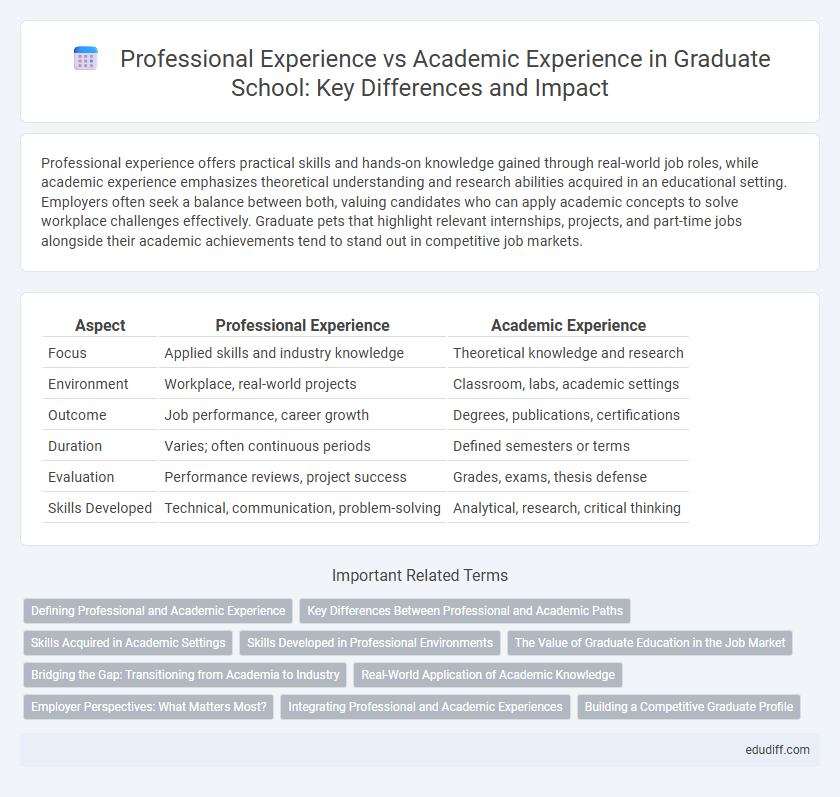Professional experience offers practical skills and hands-on knowledge gained through real-world job roles, while academic experience emphasizes theoretical understanding and research abilities acquired in an educational setting. Employers often seek a balance between both, valuing candidates who can apply academic concepts to solve workplace challenges effectively. Graduate pets that highlight relevant internships, projects, and part-time jobs alongside their academic achievements tend to stand out in competitive job markets.
Table of Comparison
| Aspect | Professional Experience | Academic Experience |
|---|---|---|
| Focus | Applied skills and industry knowledge | Theoretical knowledge and research |
| Environment | Workplace, real-world projects | Classroom, labs, academic settings |
| Outcome | Job performance, career growth | Degrees, publications, certifications |
| Duration | Varies; often continuous periods | Defined semesters or terms |
| Evaluation | Performance reviews, project success | Grades, exams, thesis defense |
| Skills Developed | Technical, communication, problem-solving | Analytical, research, critical thinking |
Defining Professional and Academic Experience
Professional experience encompasses practical, hands-on work performed in a workplace setting, demonstrating skills applied in real-world situations such as internships, jobs, or volunteer roles. Academic experience refers to knowledge and competencies gained through formal education, including coursework, research projects, and laboratory work, which build theoretical understanding and critical thinking. Distinguishing between these types of experiences is essential for graduates to effectively showcase relevant skills tailored to job requirements and academic achievements.
Key Differences Between Professional and Academic Paths
Professional experience emphasizes practical skills, real-world problem solving, and workplace collaboration, often involving measurable outcomes and project management. Academic experience centers on theoretical knowledge, research methodologies, and critical analysis within a structured educational setting, prioritizing published work and academic achievements. Key differences include the application of knowledge versus the acquisition of knowledge, with professional paths demanding adaptability and direct impact, while academic paths focus on deep specialization and contribution to scholarly discourse.
Skills Acquired in Academic Settings
Academic experience equips graduates with critical thinking, research methodologies, and theoretical knowledge essential for problem-solving in professional environments. Coursework and projects foster analytical skills, data interpretation, and effective communication, which directly translate to job performance and innovation. Collaborative assignments develop teamwork and leadership abilities, providing a foundation for workplace dynamics and project management.
Skills Developed in Professional Environments
Professional experience cultivates practical skills such as project management, teamwork, and problem-solving under real-world constraints, enhancing adaptability and communication abilities essential for workplace success. It offers exposure to industry-specific tools, technologies, and workflows that deepen technical proficiency beyond theoretical understanding. These skills often surpass academic experience by fostering leadership, time management, and client interaction capabilities critical for career advancement.
The Value of Graduate Education in the Job Market
Graduate education significantly enhances professional experience by providing advanced skills and specialized knowledge that meet the evolving demands of the job market. Employers increasingly value the critical thinking, research capabilities, and practical expertise gained through graduate programs, which often lead to higher earning potential and career advancement. Academic experience complements professional growth by fostering innovation and problem-solving abilities essential for leadership roles across industries.
Bridging the Gap: Transitioning from Academia to Industry
Bridging the gap between professional experience and academic experience requires leveraging transferable skills such as critical thinking, problem-solving, and research proficiency cultivated during graduate studies. Practical industry exposure can be enhanced through internships, co-op programs, and project-based collaborations that align academic knowledge with real-world applications. Developing strong communication skills and adaptability accelerates the transition from a theoretical academic environment to dynamic industry settings, ensuring graduates meet market demands effectively.
Real-World Application of Academic Knowledge
Professional experience enhances the real-world application of academic knowledge by providing hands-on opportunities to solve industry-specific problems and adapt theoretical concepts to practical scenarios. Graduate students benefit from internships, co-op programs, and project-based roles that bridge classroom learning with workplace demands, improving critical thinking and technical skills. This integration of academic expertise with professional environments fosters innovation and prepares graduates for effective decision-making and leadership in their careers.
Employer Perspectives: What Matters Most?
Employers prioritize professional experience because it demonstrates practical skills, problem-solving abilities, and adaptability in real-world settings compared to academic experience, which mainly reflects theoretical knowledge and discipline-specific expertise. Hiring managers often seek candidates with a history of proven performance, teamwork, and project management, which are critical indicators of workplace readiness and contribute directly to organizational goals. While academic credentials are essential for foundational knowledge, the ability to apply learning in professional contexts remains the decisive factor in candidate evaluation.
Integrating Professional and Academic Experiences
Integrating professional and academic experiences enhances a graduate's skill set by applying theoretical knowledge to real-world challenges, fostering critical thinking and problem-solving abilities. Demonstrated internships, co-op programs, or industry projects provide practical insights that complement academic research and coursework. Employers value candidates who effectively bridge academic concepts with professional applications, resulting in a well-rounded and adaptable workforce.
Building a Competitive Graduate Profile
Building a competitive graduate profile requires effectively balancing professional experience and academic achievements to demonstrate both practical skills and theoretical knowledge. Professional experience offers real-world problem-solving capabilities, leadership, and industry-specific expertise that employers highly value. Academic experience provides a strong foundation in research, critical thinking, and subject mastery, creating a comprehensive background that enhances employability and career advancement.
Professional Experience vs Academic Experience Infographic

 edudiff.com
edudiff.com